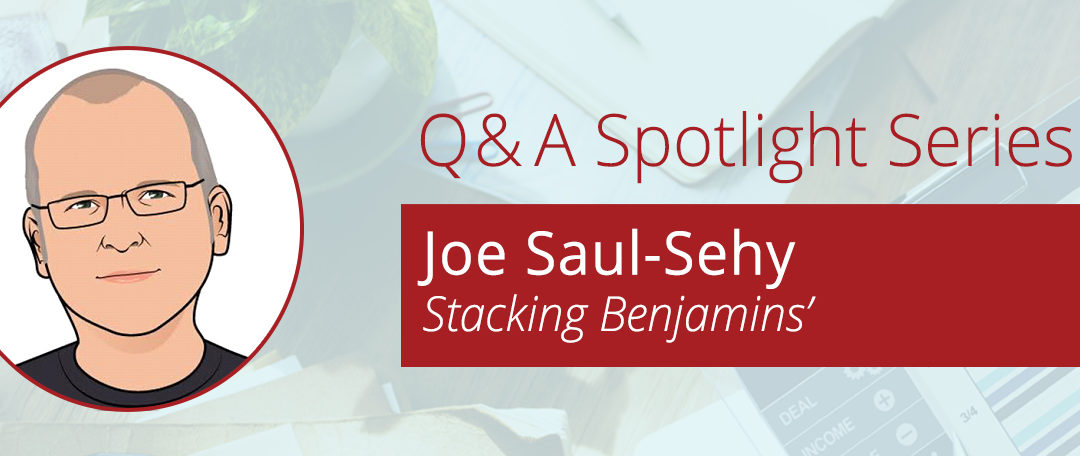Welcome to another installment of IonTuition’s Q&A series with personal finance bloggers. Today we have Stacking Benjamins’ Joe sharing his personal finance tips with us.
Joe was a financial advisor for 16 years and sold his practice at the age of 40. Joe and one of his partners created the Stacking Benjamins podcast because there were lots of gurus on the radio, and on podcasts, but very few shows with a more casual vibe…so they set out to create it. Their podcast has been written about in Inc. and FastCompany because of its innovative approach to money discussions. Over the last five years their audience has grown tremendously and they are grateful that people listen!
What career advice do you have for those who have recently graduated college or started looking into new career paths?
I don’t believe the common advice I hear that people should “follow your passion.” I also don’t think you can just find the highest paying job available in a field that you read online is “hot.” Instead, I believe you have to find the intersection between both of these. Use your passion as a starting point but then verify that there’s a viable path to income. Interview people in that field and use web searches to research employment statistics from the Department of Labor or the Bureau of Labor Statistics. You’ll have a greater chance of being both happy and employed that way! (Editor’s note: BLS data powers IonMatch’s salary estimation function, if you want to save time on searching!)
What are your best tips for people who have debt?
Read Dave Ramsey. Seriously, he is the best person I know at teaching people to value and honor their money. The biggest mistake I’ve found is that once people have paid off their debt they don’t graduate from Ramsey’s advice. There are better people to follow for investment ideas, but Dave Ramsey can’t be beat for that first step. For people who don’t want to read anything beyond this, his advice simplified is this: save $1,000 fast, then use as many dollars as possible on your smallest balance debt. Then use all the cash you can AND the cash that you saved from paying off the first debt against the second smallest balance. He calls this approach the “debt snowball” and it has worked for thousands of people.
Can you offer some advice for people who carry student loan debt and are working toward repayment and trying to become financially stable?
I think there’s a three step process here: 1) verify that you aren’t eligible for special government or job related programs with your debt before doing anything. 2) Assuming you are not, consolidate your debt to the lowest interest rate possible (Editor’s note: Consolidating federal student loans will usually increase your overall interest rate. Make sure to run some scenarios through a Consolidation calculator to see if this will save you money in the long term, since you can’t change your mind later once it’s done); then 3) balance your student loan repayments against building an emergency fund and begin to invest. If you’re paying student loans off while they’re at a low rate, you may be able to invest money toward longer term goals and earn a higher rate than you’re paying out.
In your opinion, what are the most important workplace benefits recent graduates should watch for when accepting job offers?
We’ve talked at length recently to HR and industry experts on the Stacking Benjamins show about student loan repayment programs, where your new employer agrees to help you eliminate your loans. That’s important for anyone with student loan debt. I think the biggest benefit, though, is clearly health insurance. If you don’t have good health insurance, you’ll find that buying it on the open market now may be really expensive in your state.
What was your biggest challenge when you entered the workforce (after graduation, if you attended college)? How did you overcome it, and would you do anything differently if you had another chance?
My biggest challenge when I entered the workforce was realizing that my “huge salary” really wasn’t that huge once rent, utilities, groceries and gasoline were taken out. Plus, I’d already messed up my credit and my debt situation while in college. During my freshman year I applied for a credit card and later found myself in a horrible financial mess. I only overcame it by working three jobs at once and building a tight budget so that I could sock away money to pay my debt. Not only did a solid budget and extra income work, but it taught me important lessons about the dangers of credit cards, the importance of paying attention to the bottom line, and the focus I’d always need on my financial picture to succeed in life.
Any other advice to help our readers manage their education or advance their careers?
While most people think that cutting expenses is the key to success in life, I think that finding more income is often the easier and more rewarding path. That doesn’t mean you shouldn’t take your budget seriously–you should. However, by focusing on opportunities to grow your income and then being careful with your money, you’ll find financial freedom much faster than if you just clip coupons and cut back on life.
To hear more advice from Joe listen in to his Podcast, read his blog, like him on Facebook, or follow him on Twitter.

